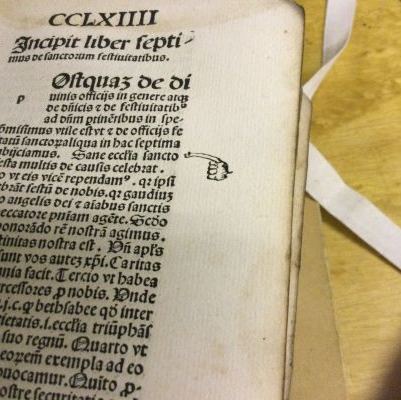Borthwick Newsletter - September 2022
Posted on 1 September 2022
September in the Archives - delve into our catalogues with this month’s featured description
Letter from C. Molyneux to Lady 'Wylstrope'. The letter has no date or identifying information except for the names of the sender and recipient. An extract of the letter reads: ' ... for otherwyse my very good Lady yor p[re]tended Love towardes me wilbe to my distruccion and utter over throwe wch I veryly beleve yow will not seeke or desier to me whow wisheth yo[w] all good fainedly. I beseche you consither how justly I have delt with you in all thinges, how giltles I am of any cryme obiected against me, and then, accordinge to your goodnes lett me recover my iust desert at your handes ...' [Miscellaneous Documents, MD/23]
What’s new?
You might remember that back in July’s newsletter, we were hard at work preparing lots of our original records for a temporary move to offsite storage, in readiness for significant work on our shelving units. The engineers started work as planned and over the last few weeks have upgraded the shelving in our larger strongroom, and started work in the smaller strongroom. This work will really improve the safety and efficiency of our archival shelving, and is the biggest update to our purpose-built building since we moved in in 2005. We’ve remained open during the works so that in-person research appointments can continue but we recommend you contact us with plenty of time before your booking so we can double check the availability of the material you might like to see.
As promised in the August newsletter, our updated LGBTQ+ History research guide is now up and running! We've still got some final tweaks to do, but we're really pleased with how it's turned out, and thanks again to our student intern Fedor for all his hard work on it!
New Accessions
Over the past month, as well as additions to the Frankie Howerd, Harry Stammers and British Orthopaedic Association archives, we’ve received a new collection in the form of the Records of the Christian Fellowship Trust (CFT). The Trust was founded by the Christian Institute for Southern Africa, itself a progressive ecumenical organisation which worked to oppose Apartheid. The Joseph Rowntree Charitable Trust was one of the Christian Fellowship Trust’s major supporters for many years, and this new collection complements the files we already have on the Trust in the JRCT’s existing archive. The new papers contain information on the arrangement of trips by grantees from South Africa to the UK and Europe, and vice versa, in the period leading up to the 1994 South African general elections - the first to be held with universal suffrage.
Number of archival descriptions on Borthcat on 1st September 2022: 100,707
New Catalogues
In August, we added two new catalogues to Borthcat as part of our long-term aim to retroconvert all our existing parish record lists into online catalogue entries. The first of this month’s entries are the records of Dunnington parish. The first recorded mention of a church at Dunnington was in 1220, although parts of the church actually date from the eleventh century. Dedicated to St Nicholas, the church was added to and restored between the 15th and 19th centuries when significant architectural work was undertaken on it by C. Hodgson Fowler. The records date from 1573 and include reference to the University’s first librarian Harry Fairhurst, after whom part of the library is named, and a book ‘containing lists of recipients of brandy, wine, cholera medicine and cod liver oil’ 1879-1899.
We’ve also added the catalogue to the parish records of Monk Fryston. The parish registers date from 1538, making them some of our earliest registers, and the origins of the church itself can be traced back to the early medieval period. Although the archive is quite small, Monk Fryston appears across a number of our other collections, including the records of Lady Elizabeth Hastings’ Charity, an education charity established in 1739. These records note the appointment of Reverend Benjamin Hemsworth of Monk Fryston Hall being appointed as a trustee to the charity in 1900. The Hemsworth family had long been patrons of the church at Monk Fryston, and we also hold records of their involvement in the restoration of the church.
News from Rare Books

It’s all about the incunables in rare books this month. Incunables, or incunabula, are books produced before 1501, during the first 50 years of printing. They’re considered to be among the most precious of books as print runs were often quite small and many titles are now lost.
I thought we had 9 incunables in the RBC so imagine my delight when I came to catalogue one of the Mirfield collection books to discover we had another. Although this particular book has no printing details, with the help of some colleagues in the rare books world we managed to track it down. It is a copy of Rationale divinorum officiorum by William Durand, a very popular mediaeval treatise, and was printed by Anton Koberger in Nuremberg in 1494. Koberger was the most successful printer in 15th century Germany, the Nuremberg Chronicle being his best known work. He was also godfather to Albrecht Dürer and had 25 children! From the signatures it looks as if this book has been in England since the early 16th century. A man called Henry John has signed his name multiple times. There are also some notes and lots of manicules, little pointy fingers, as you can see in the illustration. Once it is catalogued the book will be available for consultation in the Borthwick.
The other incunable excitement involves one of the Minster's 15th century books which took a trip to John Rylands this month for some multi spectral imaging. More information on what we found in next month’s newsletter!
Borthwick in the News
Last month’s launch of our parish register collections on Ancestry appeared on the BBC News website and our Access and Digital Engagement Archivist, Laura, also appeared in an article in The Times discussing the launch.
Archive of the Month: Records of the Drax Charity Trust and School
What is it? Records of the Drax Charity Trust, also known as the Reade Charity, which was founded in 1669 to fund a free school for boys from the parish, as well as almshouses for six local poor men and women.
Where can I find it? The catalogue to the records of the Drax Charity Trust and School is available on Borthcat.
Why is it Archive of the Month? Back in 2020, whilst we were working from home, we were able to put the complete catalogue to the Drax Charity Trust and School online, as well as supplementing it with name index entries both for pupils apprenticed from the school during the 18th and 19th centuries, and for applicants to the post of schoolmaster in 1864. The pupil indexes, originally compiled in 2009, include the boys’ names, place of residence and their intended master and trade. In some cases, individual boys also have surviving baptism certificates and correspondence relating to their indenture too.
Although the Charity was founded in 1669, from the £2000 bequest of Charles Reade, the earliest record in the archive - a grant for one of the plots of land used by the charity - dates from 1534. The archive also includes some records relating to the Drax Dame School for Infants and Girls, and the schoolmistresses who worked there, including Emily Fleeman who was born and raised in Drax and worked as the schoolmistress between 1876 and 1881.
We’ll be back with more news next month!

